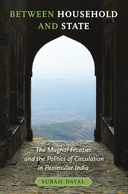Explore

Between Household and State departs from dynastic narrations of the Mughal past to highlight the role of elite households and familial networks in peninsular India, the only region of the subcontinent never fully incorporated into the imperial realm. Drawing on rare documentary and literary materials in Persian and Urdu alongside the Dutch East India Company’s archives, this book takes readers on a journey from military forts and regional courts in the Deccan to the ports and weaving villages of the Coromandel Coast. It examines how regional elite alliances, feuds, and material exchanges intersected with imperial institutions to create new forms of affinity, belonging, and social exclusion. Subah Dayal brings attention to the importance of ghar—or home—in the creation of forms of mobility that anchored the Mughal frontier across the variable geography of peninsular India in the seventeenth century.
“Subah Dayal’s impressive archival discoveries open up entirely new ways of thinking about mobility in South Asia in this exciting multilingual study.” — Purnima Dhavan, author of When Sparrows Became Hawks: The Making of the Sikh Warrior Tradition, 1699–1799
“A significant contribution. This engaging book should be required reading for anyone interested in the history of early modern South Asia and beyond.” — Ali Anooshahr, Professor of History at University of California, Davis
“Through a careful reading of historical and literary texts and archival documents, Dayal provides many original insights into the world of the seventeenth century.” — Muzaffar Alam, George V. Bobrinskoy Professor of South Asian Languages and Civilizations at University of Chicago
Subah Dayal is Assistant Professor in the Gallatin School of Individualized Study at New York University. Her writings have appeared in the Journal of the Economic and Social History of the Orient and Comparative Studies of South Asia, Africa and the Middle East.
Why read this book? Have your say.
You must be logged in to comment.
